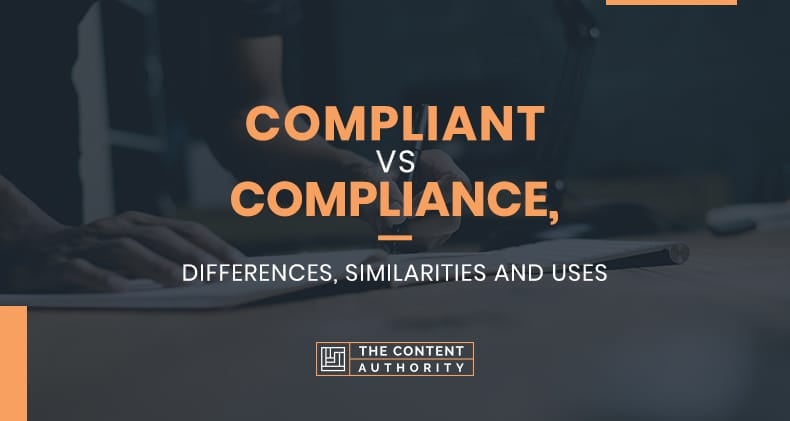Words with the same meaning usually confuse us, especially when we consider how they are used and their similarities. How could this be? Could there be a difference between words referring to the same thing?
“Compliant” is being submissively available to do what anybody wants. Used as an adjective, it means willing to comply. “Compliance” is the act of complying. “Compliant” and “compliance” are words derived from the verb “to comply.”
The verb can be used without an object; for example, people complied. But it is often used with the preposition “with,” “people should comply with the house rules.” “Compliant” and “compliance” can be used similarly as a preposition. “Compliant” is the only one that is also used with no preposition to describe a character. Example: “Gary is a compliant person.”
“Compliance” refers to a person accepting and agreeing with the wishes of other people. This person is constantly compliant. “Compliant” refers to being ready or willing to do anything for anyone. Similarly, it can refer to someone being docile.
The difference between the words is how you use them while writing or speaking. “Compliance” is used as a noun, while “compliant” is an adjective. “Compliance” is doing the action; “compliant” is a person ready to do the activity.
Material that changes volume when subjected to strength is also considered to be in compliance. In medicine, it is an organ’s ability to extend in response to applied pressure. Something that adapts “like water,” as martial artist Bruce Lee once said.
Where Do These Words Come From Initially?
The word “compliant’s” first recorded use was in 1640, and it meant yielding to desire or ready to accommodate. “Compliant” is a combination of the words “comply” and “ant.”
The term “compliance” became popular in the United States in the 20th century. Overall, “compliance” is the act of obeying. One can find the origin of the term in the Latin verb “complere.” The word “complere” means having all parts or elements or lacking nothing. Additionally, this word is the origin of the term “complete.”
In the world of law, “compliance” has always been substantial. In a legal context, “compliance” refers to obeying lawful orders and realizing the rule of law by the book. The rule of law is the guideline we follow to live our lives in a proper manner.
In the past centuries, businesses and companies have developed a culture of compliance to run a lawful line of work and bring more efficient service to communities.
What Is A Culture Of Compliance In Companies?
All companies need to be compliant with different requirements set by the government to function correctly. Hospitals and banks are the best examples of companies having specific guidelines to be compliant.
Several banks differ in handling their business, but they all have a compliance department or a compliance program. Having a compliance department in a bank is like having an internal police department. This bank’s “police force” ensures that the institution complies with the laws, regulations, and rules. The compliance department in a bank is crucial for preserving the integrity and reputation of the financial institution.
The responsibilities of a compliance department in a bank are to make sure that the institution does not exceed the regulations drawn by a congress, financial regulators, or the board of directors of the same bank. The daily task of a compliance department is monitoring its activities, controls and analyzing risk areas. Additionally, it has a responsibility to the bank’s clients to ensure the institution is not doing business with people breaking the law.
What About Hospitals?
Hospitals and health systems face incredible regulatory burdens, way more than any other sector. A compliance department is a must for any hospital. A hospital’s compliance department must handle duties similar to those of a bank. However, they tend to be more strict in their regulations. As a result, we will also find a Compliance Officer and a Compliance Committee in hospitals.
Psychology Behind the Act Of Being Compliant

Have you ever bought something because you got persuaded to do so? Gone somewhere you didn’t want to go because someone told you to go?
Being compliant is attached to psychology, which is behavior influenced by the outside world or other people. Today, social media bombardment is a way to influence people’s compliance.
In psychology, “compliance” is changing our behavior due to the request of something or another person. Not to be mistaken with obedience. A compliant person doesn’t need someone with authority to do anything another person asks them to do. “Compliance” involves changing your behavior because of another person, even if you have the chance to say no. One tends to be compliant in these situations: buying something because someone asks you to buy it, responding affirmatively to “can you help me with a favor?” and being convinced by ads on websites or social media.
Compliant behavior can be achieved in a variety of ways. A person could ask you for an enormous favor only to reduce it once you initially decline. People could also reverse this technique and ask you for small favors first, only to increase the responsibility once you agree. Promises of something extra is another technique for getting someone to be compliant, such as giving you something extra in return for your business.
A person letting you know that they are in more significant debt with you after the favor is a way to make an offer more appealing for you to comply. Moreover, flattering a person is a very effective way of getting them to be compliant. Sometimes feeling that another person has already done something for you obligates you to do something for them. A compliant person doesn’t need much to do something for another person even if they don’t want to.
Let’s Use Compliant And Compliance In Sentences.
We have already established that “compliant” is an adjective and “compliance” is a noun. That’s the main difference between both words. They both come from the verb “to comply.” I will use these in a couple of sentences to demonstrate how they can be used.
Compliant Examples
- A government can get away with pretty much anything when a compliant national press is helping it.
- My work got sidetracked yesterday because the office software wasn’t very compliant.
- Last year was the first time farming companies started being compliant with the state and national guidelines for indoor farming.
Compliance Examples
- Maria’s compliance with the exercise regime has resulted in a more rapid improvement in her health.
- At the end of the year office party, the superiors gave us all souvenirs for our compliance at work.
- The virus infected a low number of people due to compliance with quarantine rules for a few weeks.
What Other Words Can I Use That Mean The Same As Compliant Or Compliance?

We’ve learned that being compliant can be a submissive person. Using words like submissive, docile, and law-abiding will help us to describe this trait.
The word submissive means submitting to others. Docile refers to a person who is easily led or managed. Moreover, law-abiding means being excessively obedient to the law.
Examples
- All my colleagues turn submissive every time the Board of Directors changes a rule in the office.
- I like teaching my afternoon English class. I have very docile students during that time.
- Yesterday I found out our new neighbors are very law-abiding citizens.
What Would Be The Opposite Of Being Compliant Or Compliance?
Usually, a defiant person is not compliant. A defiant person is ready to propose a challenge or resist any proposition thrown at them. It is possible that the most significant contrast to these words is untoward. The word untoward means “a person difficult to manage or work with.”
Conclusion
“Compliant” and “compliance” refer to the same thing: a person willing to comply and the act of complying. The difference between the words is that one is an adjective and the other a noun. We need to know when using these words if we refer to the attributes of a person or to the type of person they are.
Shawn Manaher is the founder and CEO of The Content Authority. He’s one part content manager, one part writing ninja organizer, and two parts leader of top content creators. You don’t even want to know what he calls pancakes.


